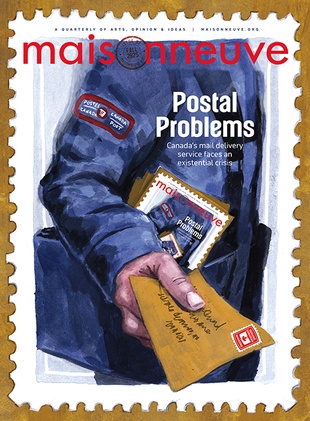Bonobo Diaries: Are You a Bonobo or a Chimpanzee?
In Uganda, to avoid highway travel, I took a ferry across Lake Victoria. I spent two days on the Ssese Islands to compile notes from my interviews with conservationists, staying in a bungalow where there was electricity only from 7 pm to midnight. Each evening, I charged all three computer batteries and nursed them through the next day, dimming the screen, hibernating the system when I got up to clear my head, managing to keep my computer alive until dusk, when, like a vampire, it lit up.
The ferry I had come on was from Entebbe, near the capital, Kampala, and I intended to take a shorter ferry ride from the opposite side of the island, west to Bukakata and Masaka, then on to Rukungiri. I carry a satellite tracker that posts my location online. Here was the general trajectory for the week:
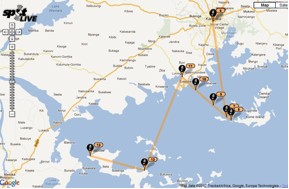
And here was where I needed to go that day:
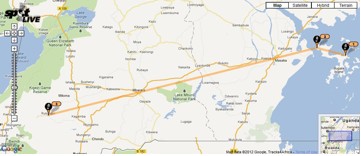
Each afternoon, when I asked the hotel owner how to get to the Kalangala ferry, about 16 km across the island—or when it ran—he waved his hand and said, "Not a problem."
The morning of my departure, the taxi he ordered turned out to be a motorcycle. I had three bags, together weighing over 80 pounds, and we put one between the handlebars, my small backpack on my chest and the big one on my back. The motorcycle groaned up a long, dusty, rutted incline through the forest, wobbling, the back tire spitting grit. The driver grunted, angling it around potholes and sharp bends in the steep road. After 2 kilometres, we came to a village of a few concrete buildings with beer and cell phone logos painted on them. The next taxi, a silver minivan, was waiting, and the driver told me we'd catch the 11 am ferry. It was 8:30, and I negotiated a price and took a seat, and waited as the music blared for two hours and the battery finally died. By then the minivan held fourteen people, three in the front, with me, and five in each of the two rows behind. The driver jumpstarted the battery with another battery taken from a shop and two frayed copper wires. With approximately 14 kilometres to go, I was worried we'd miss the ferry. He revved the engine for a few minutes, then shut it off, got out and walked away.
By the time noon rolled around, the minivan held nineteen people, men on each other's laps, heads against the ceiling, children wedged in between, wide-eyed, resembling forest animals perched in roots. The driver assured me there was an afternoon ferry, and we finally set out, the minivan so low that the dirt road grated against the floorboards and muffler with each bump. After five minutes crossing the island's spine, the passengers started yelling. The driver stopped, got out and ran back along the road. He crouched in the weeds and returned with a fish, a big one, at least 2 or 3 kilos. He threw it on my baggage in the back. The inside reeked, but everyone seemed happy.
When we arrived, there was no ferry in sight. I decided to work, and for two hours, I sat with my computer on a rough wooden bench in front of a shop selling Coke, water and peanuts. After a while, people gathered behind me to watch, laughing and pointing at my hands, and one girl said she'd never seen hands move like that. Another one began trying to read what I was writing out loud.
I walked to the ferry landing, the sun high, my shadow a scant puddle beneath my feet. A fisherman had just arrived, and I asked him how long it took to cross. "Twenty minutes," he said. I asked how much he'd charge to take me across. He stared off, thinking for a long time. The bottom of his wooden boat held a foot of water.
"35,000 shillings," he told me, clearly trying to muster confidence. $15 was a lot in Uganda, but I was supposed to meet a Peace Corps volunteer in Rukungiri, 270 kilometres away. The volunteer had offered me a place to stay, and it was already 2:30, the ferry nowhere in sight.
When I got in the boat, a dozen people jumped in as well, two of them throwing a motorcycle across the middle. We set off, and I realized I had no sunblock. I rarely burn, but the sun was extreme, and I was relieved to discover that the trip was actually only twenty minutes. The ferry was docked on the other side, its crew in the shade of a small leaning building of weathered boards, all of them asleep.
The only taxi was a motorcycle (called a boda-boda in Uganda, from the English "border-to-border," the expression dating back to when motorcycle taxis were the easiest way to cross borders). I asked how much a boda-boda ride would cost to Masaka, 40 kilometres away. We negotiated a price, put one bag over the handle bars, another on my back and one on my chest.
Boda-bodas are light motorcycles, maybe 100 cc, and this one was old, creaking under our weight. The road was terrible, rutted and potholed and covered in thick, red dust, and the driver took us over it at such a speed that the frame vibrated erratically. He swerved past cows, bicyclists and half-naked, gawking children.
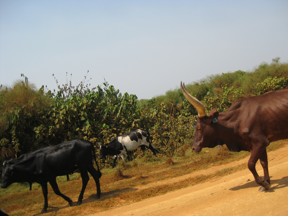
He rode at nearly 80 kilometres an hour over narrow ridges between deep ruts, but when trucks neared, roiling up dust on their way to the ferry, he slammed the brakes. We were enveloped in a red cloud so thick I had to hold my breath and close my eyes. This happened over a dozen times. Though the trip took an hour and half in the direct sun, within thirty minutes I was so caked in dust that sunburn was no longer a danger.
Uganda is approximately the forty-fifth country I've traveled in (I go online here to pay carbon offsets for my travel miles). Even in my teens and early twenties, I wandered throughout North America, driving to the Arctic or to Mexico, and I've had many thrilling or terrifying or simply amusing days of travel. This one was sure to rank high among them, especially since I was carrying my field supplies for the Congo rainforest. The bags felt increasingly heavy, and with each bump in the road, I slid closer to a ridged metal tray behind the seat. Trying to stay in place and keep my backpack over my centre was like doing an hour-and-half-long abdominal crunch.
But as with anything, I got used to it and began thinking about why I was enjoying this so much. A few platitudes crossed my mind. I recalled an Australian who'd said that he surfed because men need to feel the threat of death each day. Danger, low-grade or not, certainly allows us to feel more alive.
But people have told me that I must not be comfortable in domestic settings-being thirty-seven, unmarried and without children. True or not, I got to thinking about my research on bonobo conservationism, how people who work with primates often identified themselves with either chimpanzees or bonobos. I have heard people say that the two animals (both sharing about 98.6 percent of our DNA) represent a different aspect of human nature. Chimpanzees have male-dominated societies. The alpha male negotiates pacts, sharing females to build alliances, and then slaughters his enemies, whose newborn children he also kills in order to force females into estrus. Intercourse is rear-entry, with the male the dominant partner. Organized warfare, with the decimation of entire communities, occasionally takes place. Dr. Joshua Rukundo at the Ngamba Island chimpanzee sanctuary described how chimps often tried to rip each other's muscles off, and how he was frequently stitching them back up. But to be fair, chimpanzees also show affection and group cohesion just as humans do, and they are a long way from matching our atrocities.
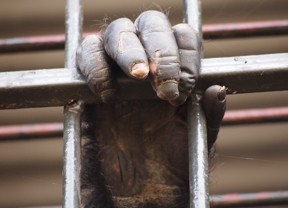
The battered hand of a former alpha male chimpanzee.
Though bonobos also express their aggression with fights and hierarchy, they are unarguably gentler. As discussed in previous posts, they often look each other in the eyes during intercourse. Instead of waging war when they meet another group, they shout for a while and then engage in an orgy. Unlike all other great apes—chimpanzees, gorillas, orangutans and humans—they have never been witnessed killing each other and, along with orangutans, do not commit infanticide. Finally, unlike the others, bonobos have a gene for domestication.
Several weeks ago, Sue Savage-Rumbaugh, the bonobo researcher whom I interviewed for an earlier post and whose worked earned her a place among Time's one hundred most influential people for 2011, told me that she believes humans and bonobos once lived together. The gene for domestication suggests this, given that all creatures with this gene have lived among humans. However, serendipitously, a few days later, a friend sent me an article on Duke researcher Brian Hare, who suggests that bonobos in fact domesticated themselves. He hypothesizes that bonobos, which are sometimes called pygmy chimpanzees (though most bonobo researchers reject this name), were separated from chimpanzees two million years ago by the Congo River. Neither ape swims, and on the northern range chimpanzees competed with gorillas for food, favoring aggressive traits for survival. South of the river, bonobos had no competition and lived in a wet, abundant forest. Hare believes that the females refused to breed with aggressive males, eventually domesticating themselves, which might explain the gene. Furthermore, domestic animals tend to retain childhood traits and remain smaller, and Bonobos are certainly both smaller and more childlike in appearance than chimps.
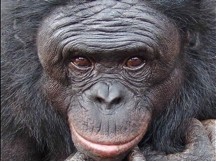
(Kanzi of bonobohope.org looking wiser than I do. Photo by Liz Robert-Pugh.)
On the flipside, Sue Savage-Rumbaugh's theory of human-bonobo cohabitation finds support in the traditional stories of Wamba, a region in the Congo where humans have prohibited bonobo hunting for centuries. They speak of bonobos returning lost children to villages, and of humans learning what foods to eat from bonobos. But it is hard for me to imagine humans, as I know them, being that kind to another creature without totally subjugating it. Still, the theory is interesting, and human are dramatically determined by culture, so the possibility of past relationships between bonobos and humans is not unimaginable.
As the motorcycle raced, I considered all this. It helped me forget the dust filling my nose and eyes. Could women domesticate us as well, heed Jesus' words and shack up only with the meekest? How much could a shift in culture change us, and what would we do differently from day to day? Unfortunately, a line from Yeats came to mind: "The best lack all conviction, while the worst / Are full of passionate intensity."
A bonobo researcher once explained to me his belief that culture determines genetic expression, that we might soon be able to document epigenetic shifts with the work on primates. I don't feel that I relate more to chimpanzees or to bonobos, but that I'm somewhere in between-part of the human race after all, with our history of carnage, cohesion, and creativity. Studying primates has made me reflect more on humans, on our potential for change and the boundaries of the instincts and cultures that rule us. Maybe writing about bonobos has been my way of studying a more peaceful side. As I have been discovering in my interviews with conservationists, much of, if not everything, we research reflects a desire to change, a subject I will no doubt touch on soon as I travel with conservationists who have dedicated their lives to the environment.
The day rolled on, thirteen hours of travel: more crammed vans, these ones full-sized matatus, more motorcycle taxis in between, and then a final motorcycle down a long rutted road in Rukungiri, where the driver lost control and slid sideways along a dusty incline until we both had our feet on the ground, trying to keep from falling into the ditch.
Jake, the Peace Corps volunteer, was waiting when I arrived. He told me he had no idea why the driver took that road when there was a paved one that went to the same place. "He was probably drinking," he said. "Those guys drink a lot. Or maybe he just thought it was faster."
Deni Y. Béchard's first novel, Vandal Love, won the Commonwealth Writers' Prize. Over the next several months, he will blog for Maisonneuve regularly from central Africa as he researches his new book. Track him online here with a satellite GPS tracker. His travel updates and reading habits are on Twitter at @denibechard.
Subscribe to Maisonneuve today.
Related on maisonneuve.org:
—Bonobo Diaries: Why I'm Writing a Book About the Congo
—Bonobo Diaries: A Conversation With Sue Savage-Rumbaugh
—Bonobo Diaries: The Ravages of Development




